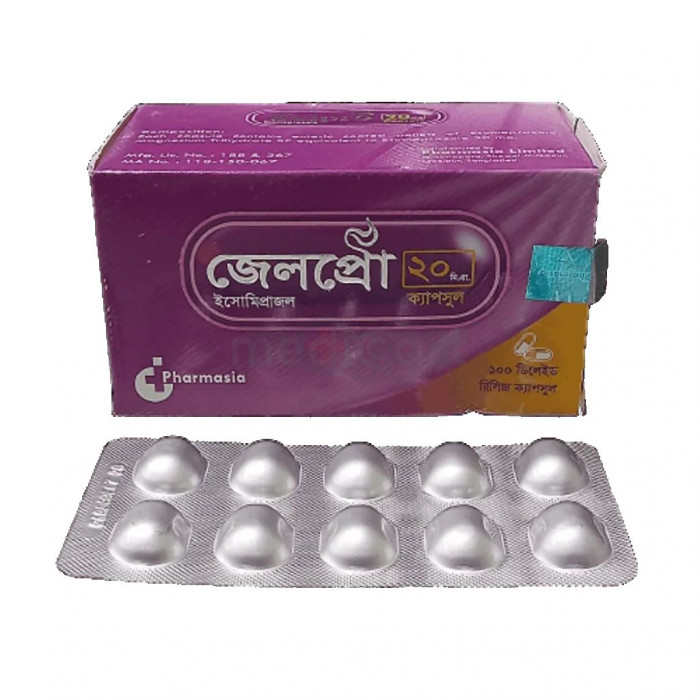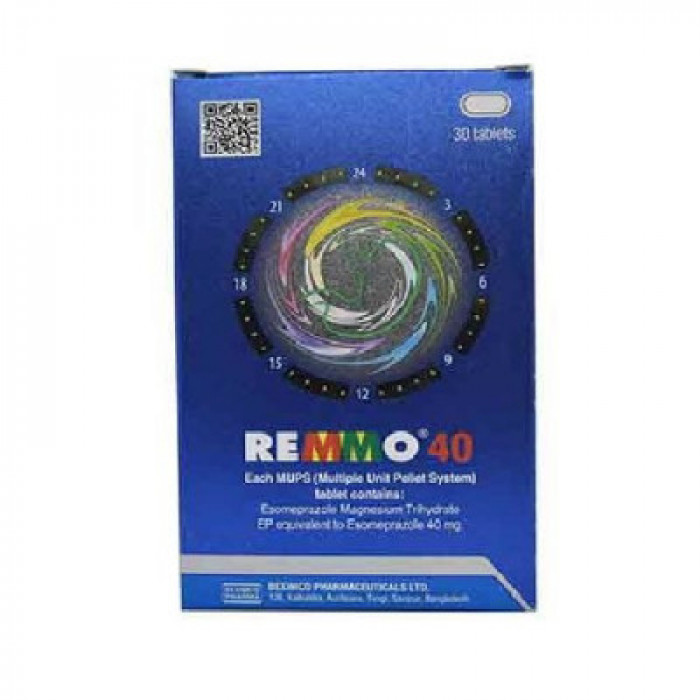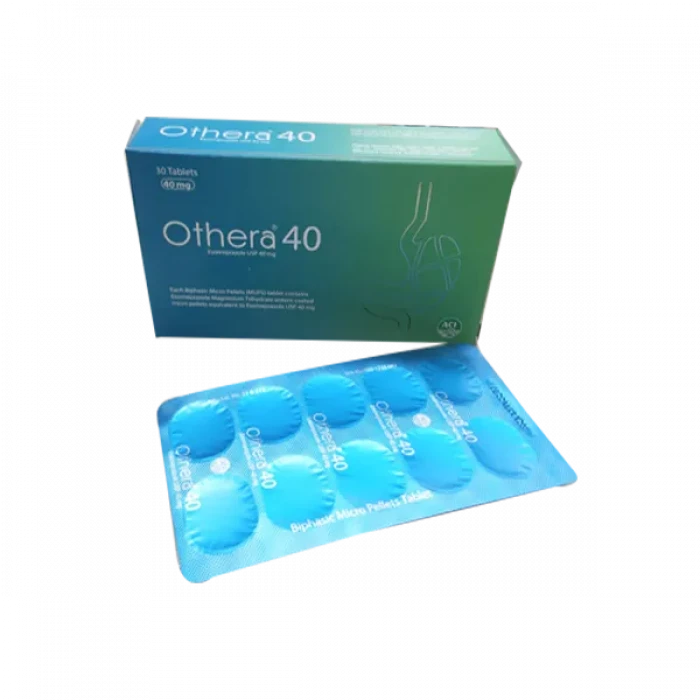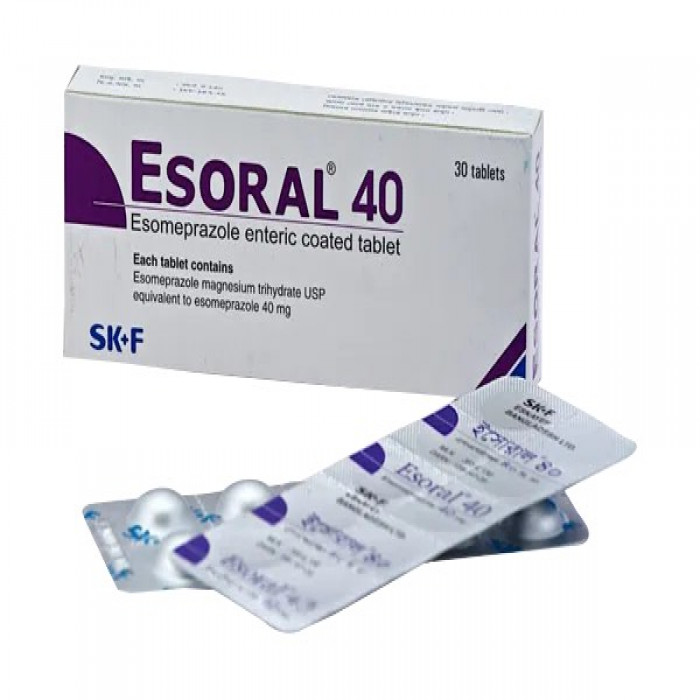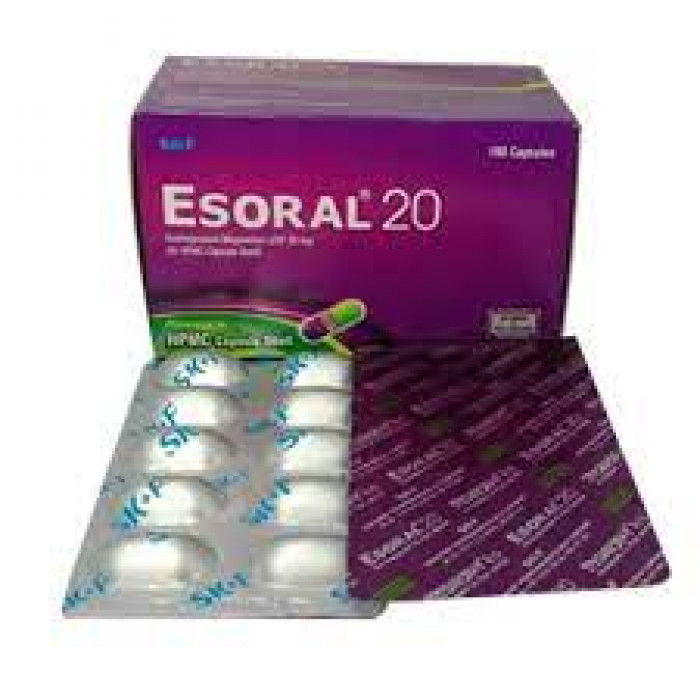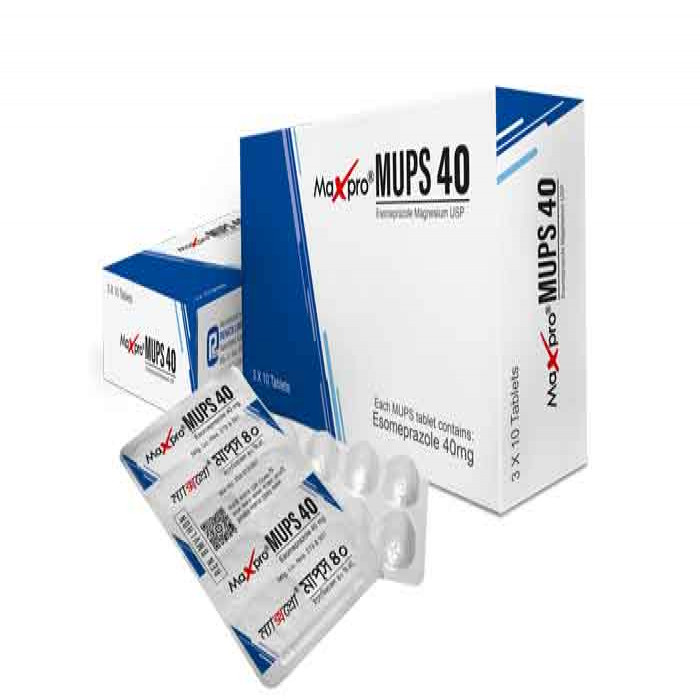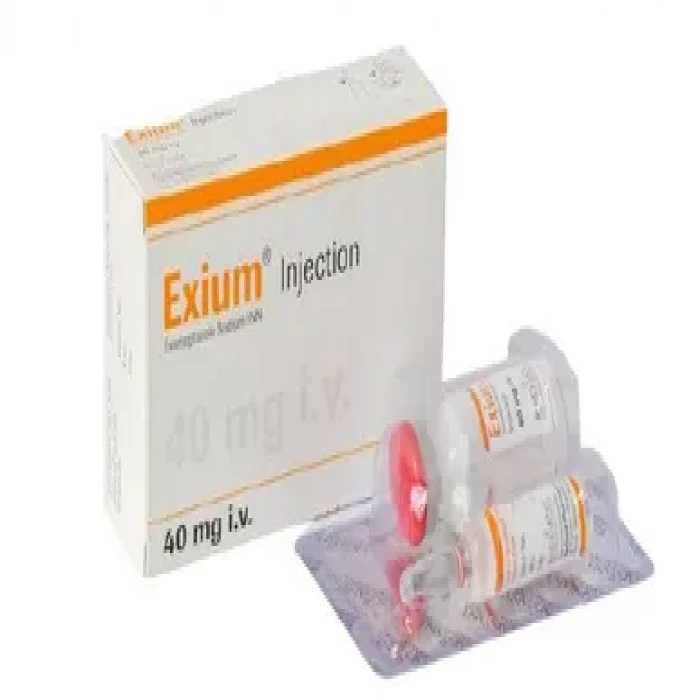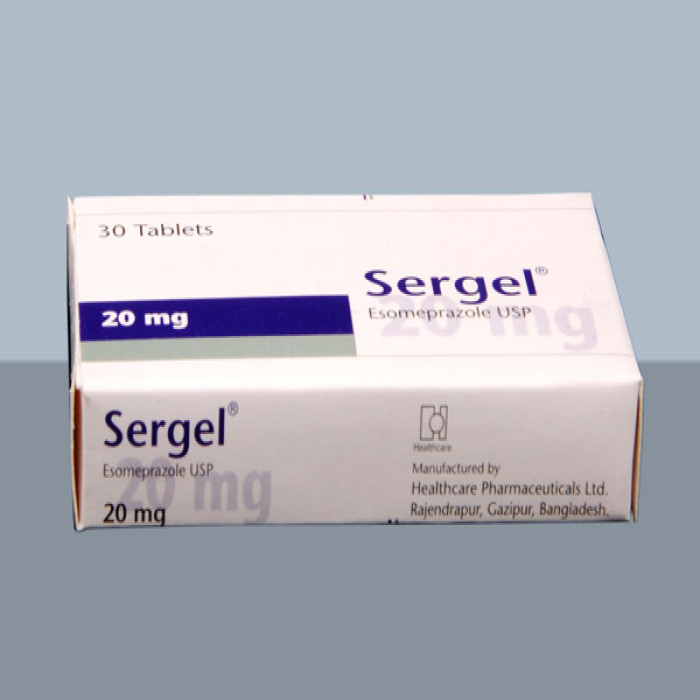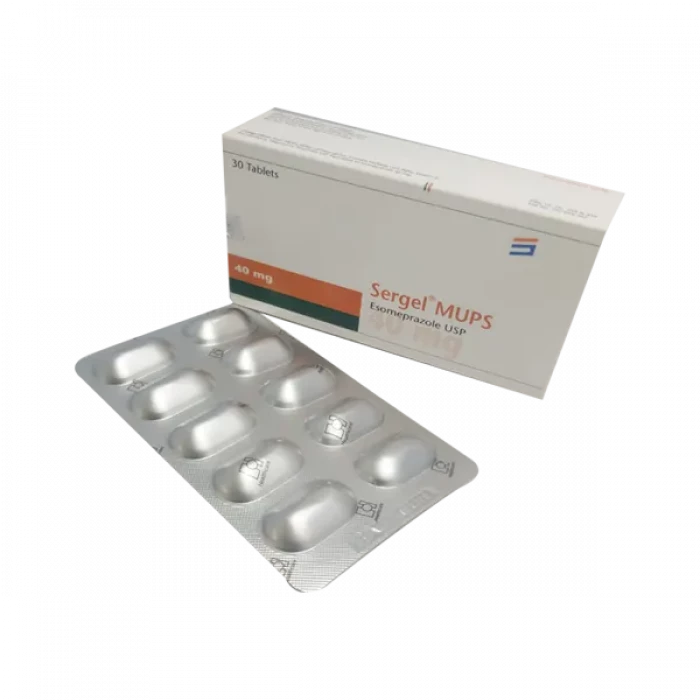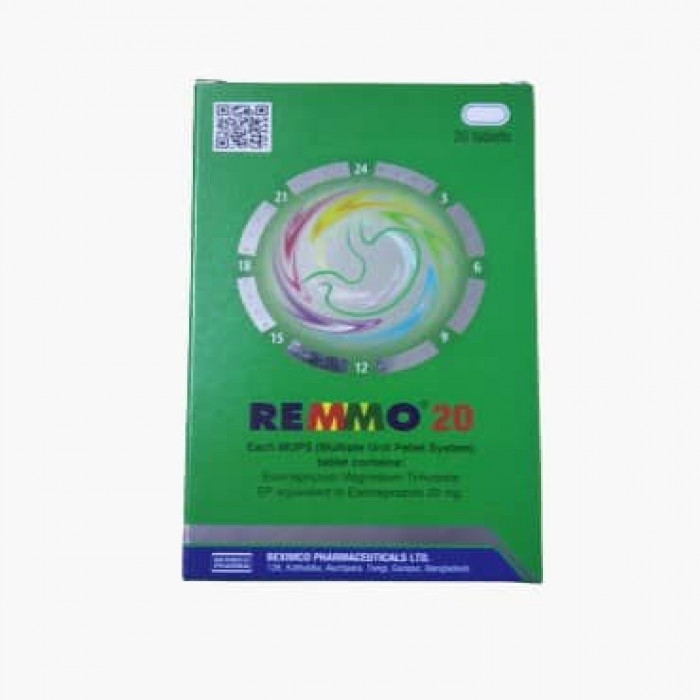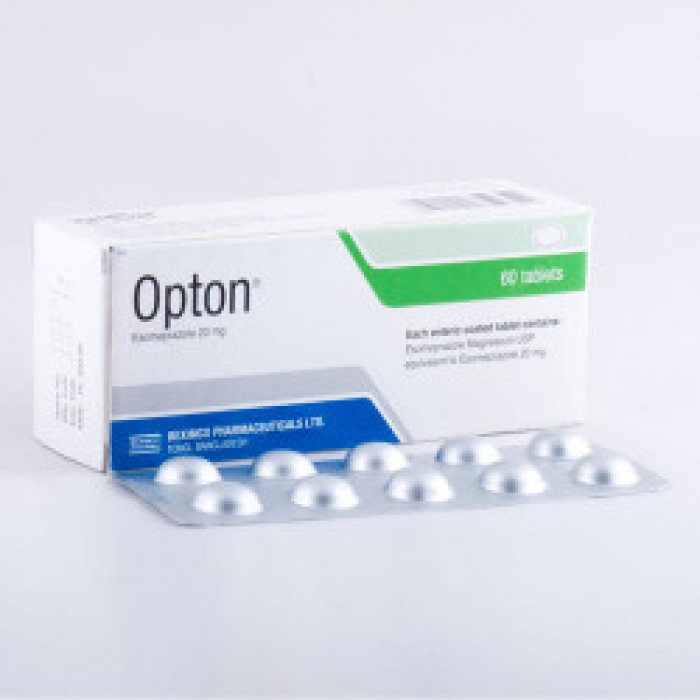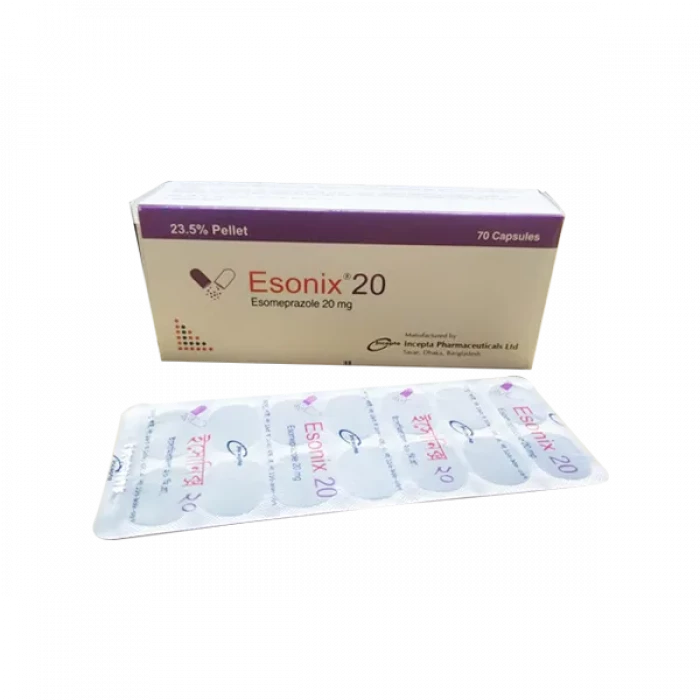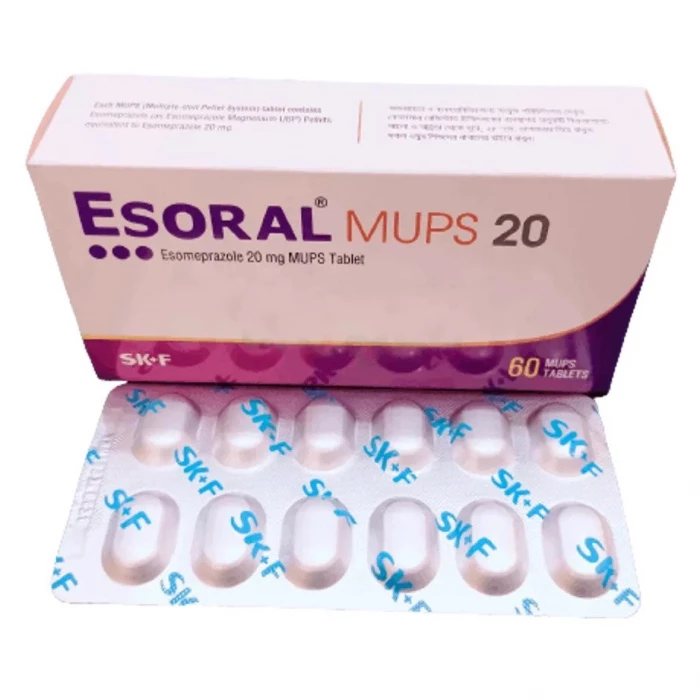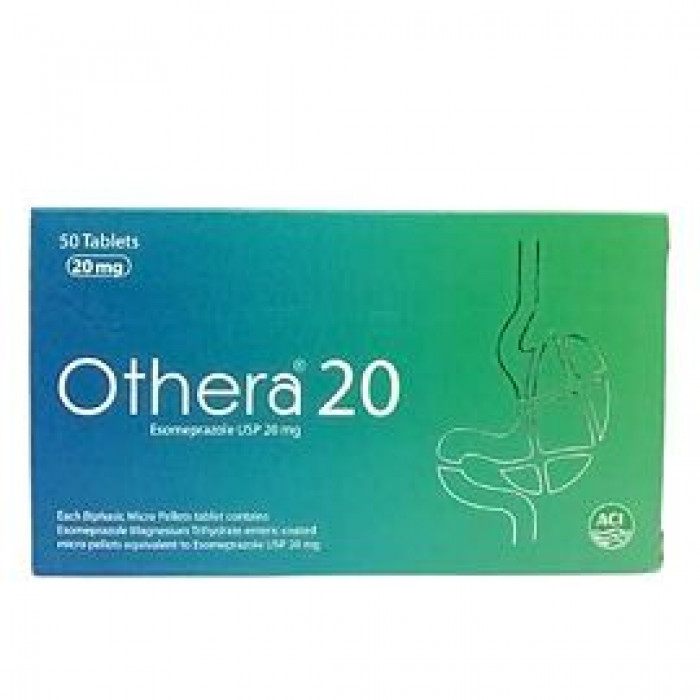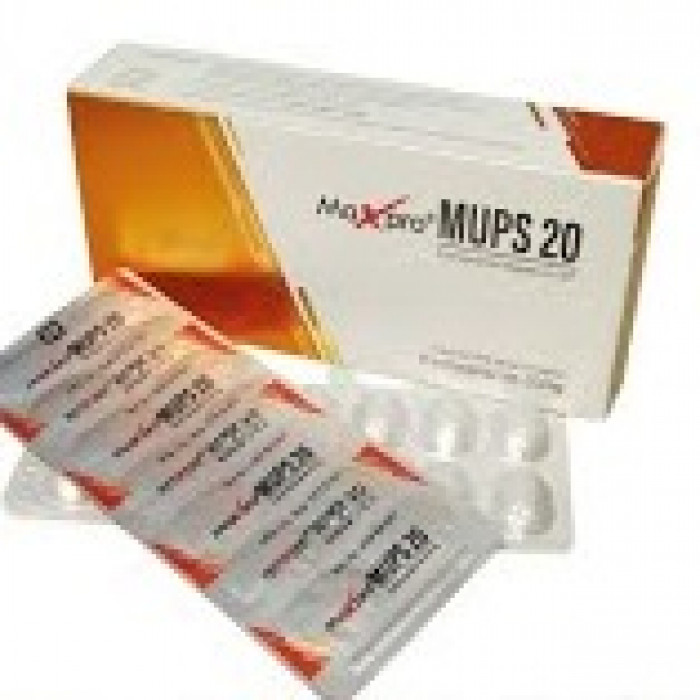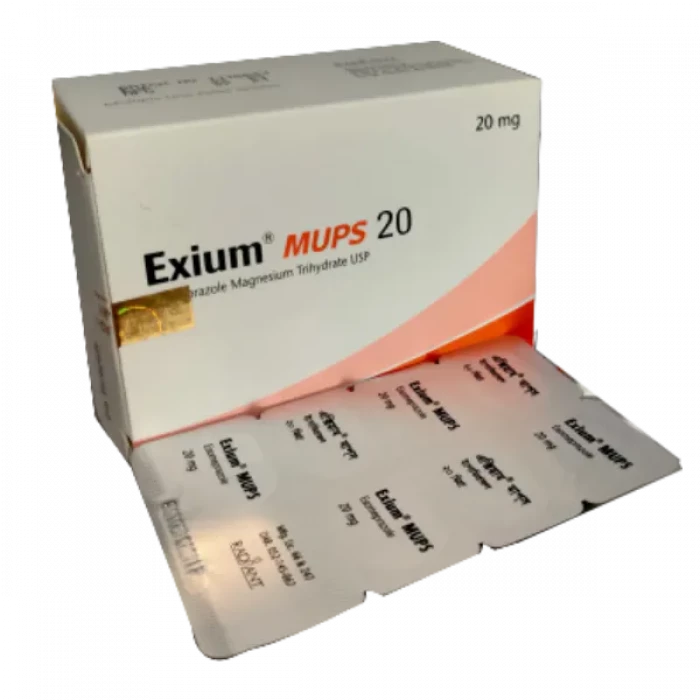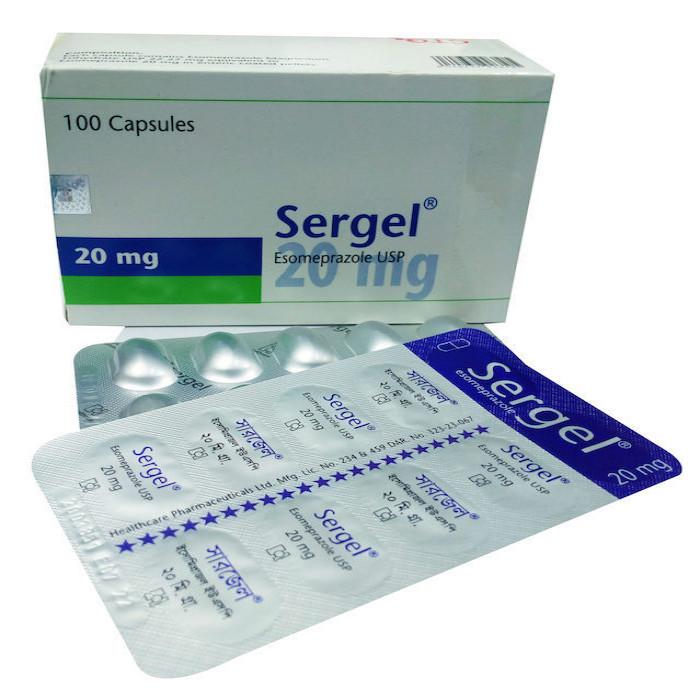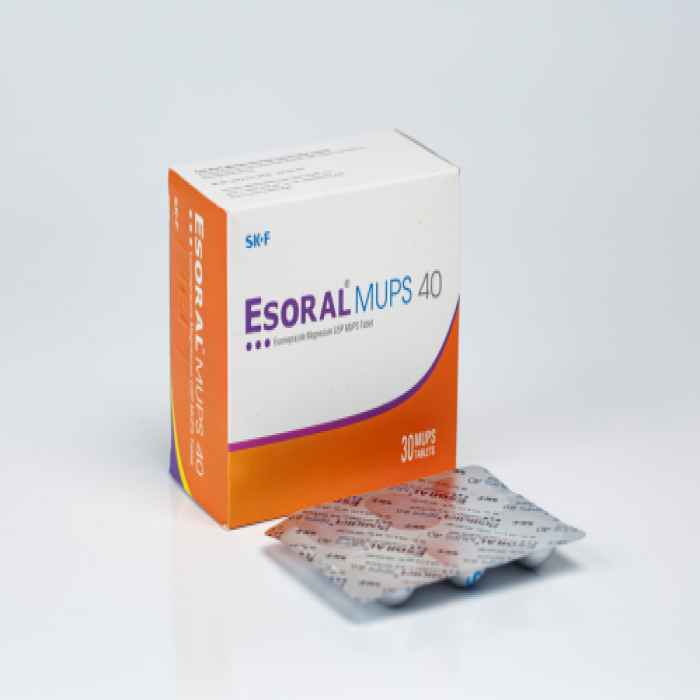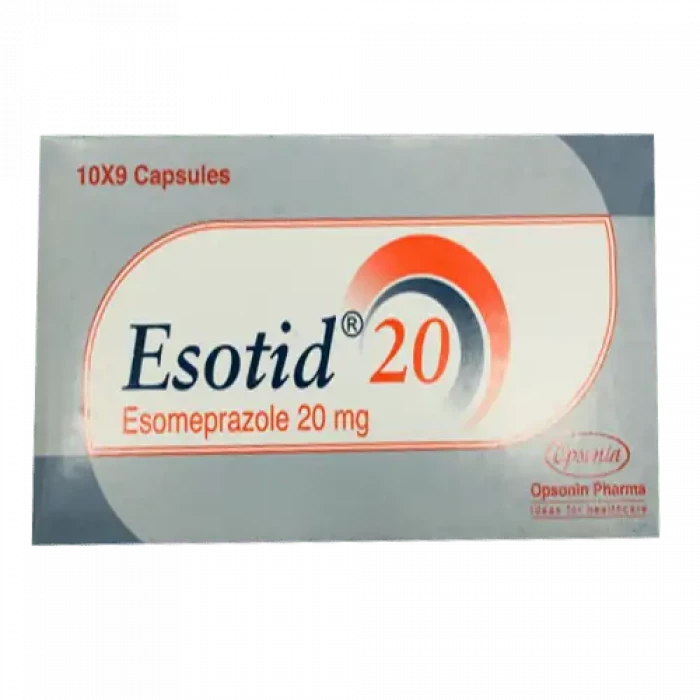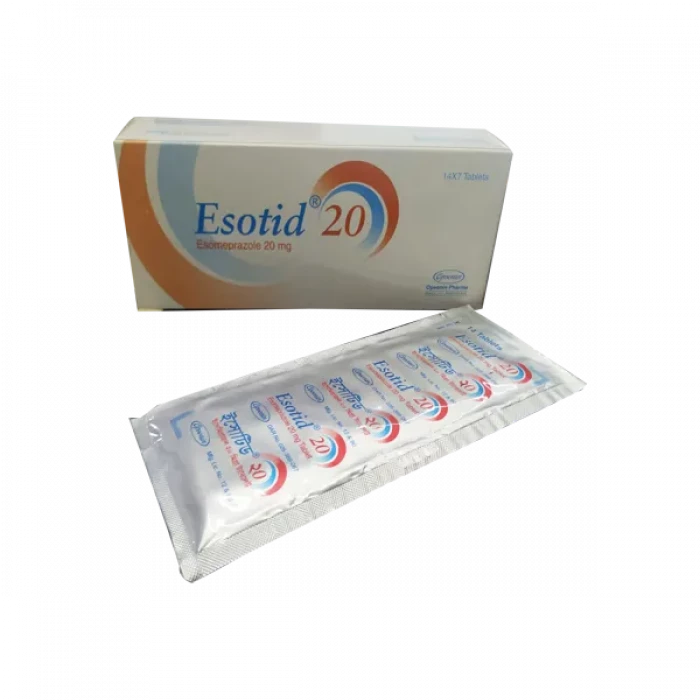

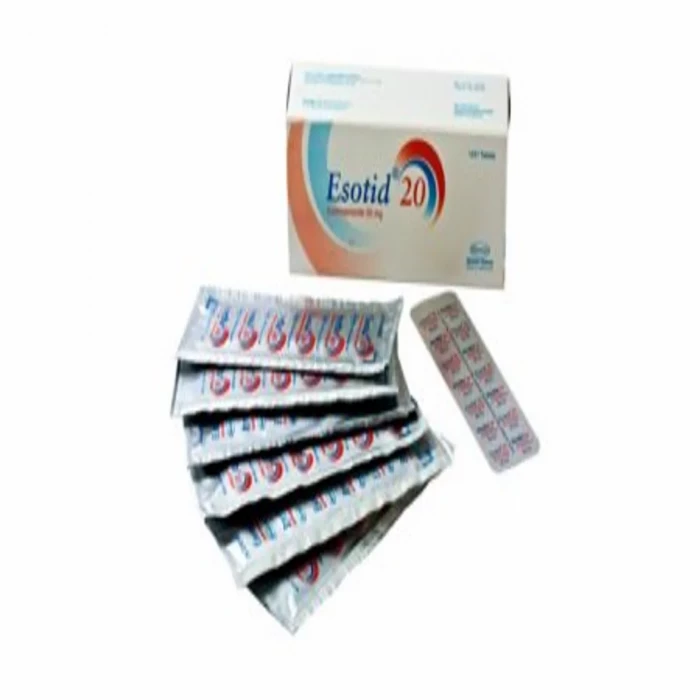
✔ 100% Authentic Product

Esotid 20mg/ Esomeprazole is used to treat various digestive conditions such as Gastroesophageal Reflux Disease (GERD), Peptic Ulcers, and Zollinger-Ellison Syndrome.

🛒 How to order this item?

100% Genuine Products, Guaranteed
Safe & Secure Payments, Always
Fast, Secure & Efficient Delivery
Proper Packaging
Cashback offer(Optional):
- 🏷 Coupon CASH55 ✔️ Get ৳55 back - for Ordering ৳500+
- 🏷 Coupon CASH120 ✔️ Get ৳120 back - for Ordering ৳1200+
- 🏷 Coupon CASH200 ✔️ Get ৳200 back - for Ordering ৳2500+
- 🏷 Coupon CASH300 ✔️ Get ৳300 back - for Ordering ৳3500+
- 🏷 Coupon CASH400 ✔️ Get ৳400 back - for Ordering ৳4500+
- 🏷 Coupon CASH500 ✔️ Get ৳500 back - for Ordering ৳5500+
- 🔹 Delivery charge is applicable for Cashback offer
- 🔹 Foreign manufacturer products are not applicable for Cashback offer
Show More
 Cash on Delivery - All over Bangladesh
Cash on Delivery - All over Bangladesh Urgent Delivery - 2 Hours Dhaka City
Urgent Delivery - 2 Hours Dhaka City ফ্রি ডেলিভারি! - ১৪৯৯ টাকা+ অর্ডারে ঢাকা
শহরে ।
ফ্রি ডেলিভারি! - ১৪৯৯ টাকা+ অর্ডারে ঢাকা
শহরে । ফ্রি ডেলিভারি! - ২৯৯৯ টাকা+ অর্ডারে ঢাকার
বাহিরে ।
ফ্রি ডেলিভারি! - ২৯৯৯ টাকা+ অর্ডারে ঢাকার
বাহিরে ।
✅ Description:
Esotid 20mg Tablet is a medication used to treat various conditions caused by excessive stomach acid production. It is commonly prescribed for erosive esophagitis, gastroesophageal reflux disease (GERD), Helicobacter pylori infection, and Zollinger-Ellison syndrome (tumors in the pancreas or upper part of the small intestine).
The tablet is typically used for short-term treatment of severe erosive esophagitis (grade 2 or above) as diagnosed by endoscopy, as well as for short-term treatment of symptomatic GERD that is unresponsive to standard medical treatment. It can also be used to alleviate heartburn and other symptoms associated with GERD, manage pathological hypersecretory conditions, treat peptic ulcer disease, aid in gastric ulcer therapy, and maintain healing of erosive esophagitis. Additionally, it is approved for combination use in eradicating H. pylori in patients with active duodenal ulcers.
Esotid 20mg Tablet belongs to a group of medications known as proton pump inhibitors, which work by blocking the proton pump in the stomach cells. By inhibiting this pump, the production of stomach acid is reduced.
The dosage of this medication is determined by the doctor based on factors such as age, the severity of the condition, medical history, and individual response to the initial dose.
It's important to note that this medication is metabolized by the liver, so individuals with chronic liver disease may have difficulty processing it, leading to drug accumulation. Pregnant and breastfeeding women should consult their doctor before taking this medication, as it can pass through breast milk to the child.
Common side effects of Esotid 20mg Tablet include diarrhea, gas, vomiting, headache, nausea, and stomach aches. Although rare, there is a possibility of experiencing severe adverse reactions such as the increased risk of bone fractures, decreased magnesium levels, seizures, irregular heartbeats, jitteriness, muscle spasms, and weakness, spasms in the feet/hands/voice box, among others. Prolonged use of this medication, typically over three years, may result in decreased absorption of Vitamin B12 by the body.
Rare side effects may include diarrhea, inflammation of the intestine and stomach lining, kidney damage, allergic reactions, weight loss, and fever.
Please note that the information provided here is based on the active ingredient of the medication. The specific uses and effects may vary from person to person. It is advisable to consult a gastroenterologist before using Esotid 20mg Tablet or any other medication.
Safety Advices

Alcohol
UNSAFE
Although there is no known interaction with alcohol, drinking alcohol increases acidity further and may worsen issues related to the digestive system. Hence, alcohol should be avoided.

Pregnancy
CONSULT YOUR DOCTOR
Esotid 20mg Tablet can be used during pregnancy. However, it should be used only under the recommendation of a doctor after assessing if this medicine is beneficial and will not harm the unborn child.

Breastfeeding
CONSULT YOUR DOCTOR
Esotid 20mg Tablet should not be used by lactating mothers as it is not known if this medicine is passed into the breast milk and can have undesirable effects on the nursing infant.

Driving
CAUTION
Esotid 20mg Tablet shows side effects like dizziness and blurred vision which can affect your driving ability. If you experience any such symptoms, do not drive.

Kidney
CAUTION
Esotid 20 is safe to use in patients with kidney disease. No dose adjustment of Esotid 20 is recommended. However, inform your doctor if you have any kidney disease.

Liver
CAUTION
Esotid 20 should be used with caution in patients with severe liver disease. A dose adjustment of Esotid 20 may be needed. Please consult your doctor.
✔️ Uses of Esotid 20mg Tablet
The medication can treat the below-provided problems:
- Erosive Esophagitis
- Gastroesophageal Reflux Disease
- Helicobacter Pylori Infection
- Zollinger-Ellison Syndrome
- Other Forms Of Ulcers
- Heartburn
- Acidity
✔️ How does Esotid 20mg Tablet work?
Esotid 20mg Tablet belongs to the class of proton pump inhibitor drugs and binds to H+/K+-exchanging ATPase in gastric parietal cells, resulting in blockage of acid secretion.
✔️ Side Effects of Esotid 20mg Tablet
The most common side effects associated with Esomeprazole include
- Dizziness
- Dryness in mouth
- Headache
- Nausea
- Abdominal pain
- Constipation
- Flatulence
- Diarrhea.
✔️ Quick Suggestions:
- It is recommended to use this medicine in the prescribed manner. However, anti-reflux medicines should preferably be taken in the morning on an empty stomach or with food for optimum effectiveness.
- You can make certain lifestyle modifications like preventing excess intake of foods that cause acidity, like carbonated drinks and oily/fried food, regular exercise and maintaining a healthy weight.
- It is also advised to limit alcohol intake and quit smoking for better treatment of your acidity.
- It is advised to reduce stress and get good sleep each night.
- Inform your doctor if you are using this medicine as a continuous treatment of acidity for more than 4 weeks or if the symptoms are persistent even after taking the medicine.
- This medicine can hamper the actions of other medicines taken simultaneously. Inform your doctor if you are using any other medicines.
✔️ Indication
- For the treatment of ulcers in the stomach and intestine.
- Provide relief from heartburn, pain and chest pain due to acid reflux disease such as GERD (Gastroesophageal reflux disease).
- Treatment of Zollinger-Ellison syndrome, a condition of increased acid production in the stomach due to the tumour.
- Treatment of ulcers due to excessive use of pain killers and certain antibiotics.
- To eradicate the infection of a bacteria, H. Pylori which if left untreated can cause ulcers.
✔️ Pharmacology
Esomeprazole is a proton pump inhibitor that reduces stomach acid production by specifically inhibiting the H+/K+-ATPase in the gastric parietal cell. Esomeprazole (S-isomer of omeprazole) is the first proton pump inhibitor with a single optical isomer that outperforms racemic proton pump inhibitors in acid control.
For absorption, esomeprazole capsules contain an enteric-coated pellet formulation of esomeprazole magnesium. Peak plasma levels (Cmax) occur approximately 1.5 hours after oral administration (Tmax). When the dose is increased, the Cmax rises proportionally, and the area under the plasma concentration-time curve (AUC) rises three times from 20 to 40 mg. With repeated once-daily administration, systemic bioavailability is around 90%, compared to 64% with a single dose. In comparison to fasting conditions, the AUC after a single dose of esomeprazole is reduced by 33-53 percent after food ingestion. Esomeprazole should be taken at least one hour before meals. In 97 percent of cases, esomeprazole is linked to plasma proteins. Plasma protein binding is constant over a concentration range of 2 20 mmol/L. At a steady state, the apparent volume of distribution in healthy individuals is around 16 L. In the liver, the cytochrome P450 (CYP) enzyme system extensively metabolizes esomeprazole. Metabolites of esomeprazole have no anti-secretory activity. The majority of esomeprazole metabolism is carried out by the CYP2C19 isoenzyme, which generates the hydroxy and desmethyl metabolites. The rest is reliant on CYP3A4, which generates the sulphone metabolite. The plasma elimination half-life of esomeprazole is approximately 1-1.5 hours. Less than 1% of the parent medication is eliminated in the urine. Approximately 80% of an oral dose of esomeprazole is eliminated as inactive metabolites in the urine, with the remainder detected as inactive metabolites in the feces.
✔️ Dosage & Administration of Esotid 20mg Tablet
- Healing of Erosive Esophagitis: 20 mg or 40 mg Once Daily for 4-8 Weeks.
- The majority of patients are healed within 4 to 8 weeks. For patients who don't heal after 4-8 weeks, an additional 4-8 weeks of treatment may be considered. Maintenance of Healing of Erosive
- Esophagitis: 20 mg Once Daily (Clinical studies did not extend 6 months).
- GERD Symptoms: 20 mg once daily for 4 weeks. If symptoms do not completely resolve after four weeks, an additional four weeks of treatment may be considered.
- Helicobacter Pylori eradication: Esomeprazole 40 mg once daily for 10 days, Amoxicillin 1000 mg twice daily for 10 days, Clarithromycin 500 mg twice daily for 10 days to reduce the risk of recurrence of Duodenal Ulcer.
- The dose for Zollinger-Ellison Syndrome is 20-80 mg once daily. Individual dosage adjustments should be made, and treatment should be continued for as long as clinically indicated.
- Acid-related dyspepsia: 20-40 mg once daily for 2-4 weeks, as needed.
Esomeprazole tablet or capsule should be swallowed whole and taken one hour before a meal. Do not chew, crush or break it.
✔️ Interaction
Interaction with Alcohol: The interaction of Esotid 20mg Tablet with alcohol is not known. It is recommended to consult your doctor before consuming alcohol while taking this medication.
Interaction with Lab Test - Neuroendocrine tumor diagnosis: Esotid 20mg Tablet should not be used while undergoing neuroendocrine/carcinoid tumor tests as it may lead to a false-positive result. It is important to inform your healthcare provider about the use of this medication before undergoing such tests.
Interaction with Other Medications:
Clopidogrel: Report the use of Esotid 20mg Tablet and Clopidogrel to your doctor. Your doctor may prescribe a safer alternative for reducing stomach acidity while you are being treated with Clopidogrel.
Ketoconazole: Caution should be exercised when using Esotid 20mg Tablet with Ketoconazole or other antifungals of the same group. Inform your doctor about the usage of either of these medications to determine safer alternatives.
Methotrexate: Esotid 20mg Tablet should not be used with Methotrexate. It is important to report the use of either of these drugs to your doctor so that a safer substitute can be prescribed.
Warfarin: The usage of Esotid 20mg Tablet with Warfarin should be strictly monitored by your doctor. Suitable dosage adjustments and monitoring of Prothrombin time are necessary to ensure safety. Any symptoms like unusual bleeding, swelling, vomiting, or the presence of blood in the urine should be reported immediately.
Nelfinavir: Esotid 20mg Tablet is not recommended for use when the patient is already taking antiviral medications like Nelfinavir or other drugs used in the management of HIV infection.
Digoxin: This medication should be used with caution if the patient is on Digoxin. Prior usage of any of these drugs should be informed to the doctor. Any symptoms like nausea, vomiting, diarrhea, loss of appetite, disturbances in vision, and abnormalities in heartbeat should be reported immediately.
Interaction with Diseases:
Liver Disease: Any history of liver disease should be reported to the doctor. Suitable dose adjustment may be required based on the extent of liver impairment.
Osteoporosis: Patients with osteoporosis-related fractures may require suitable dose adjustments when taking Esotid 20mg Tablet.
Hypomagnesemia: Inform your doctor about any imbalance in magnesium levels in the body. Regular monitoring is advised for patients taking Esotid 20mg Tablet in such cases.
Please note that this information is based on general knowledge, and it is always recommended to consult your doctor or healthcare provider for specific advice tailored to your individual situation.
✔️ Contraindications
Esomeprazole is not recommended for patients who have a history of hypersensitivity to any component of the formulation or substituted Benzimidazoles.
✔️ Pregnancy & Lactation
In pregnant women, there are no appropriate and well-controlled trials. Teratogenic effects have not been discovered in animal investigations. Esomeprazole excretion in milk has not been examined. If the use of esomeprazole is deemed necessary, breastfeeding should be stopped.
✔️ Precautions & Warnings
- In general, symptomatic response to esomeprazole treatment does not rule out stomach cancer.
- According to the manufacturer's instructions, esomeprazole pills should be taken at least one hour before meals.
- If a patient has difficulty swallowing capsules, place one spoonful of applesauce in an empty bowl, open the Esomeprazole capsules, and carefully pour the pellets within the capsule into the applesauce.
- The pellets should be mixed with the applesauce and consumed quickly.
- The applesauce should be cold and mushy enough that it can be eaten without chewing.
- It is not advised to consume or crush the pellets.
- The pellet/applesauce mixture should not be refrigerated for future use. Antacids may be used while taking esomeprazole.
✔️ Storage Conditions
Store in a dry location at a temperature not exceeding 30°C. Keep out of direct sunlight and dampness. Keep out of children's reach.
Disclaimer:
ePharma sole intention is to ensure that its consumers get proper
information as musch as possible. Although we do not guarantee the
accuracy and the completeness of the information that provided and
here information is for informational purposes only.
The information contained herein should NOT be used as a substitute
for the advice of a qualified physician. This may not cover
everything about particular health conditions,
lab tests, medicines, all possible side effects, drug interactions,
warnings, alerts, etc. Please consult your healthcare professional
and discuss all your queries related to any disease or medicine. We
intend to support, not replace, the doctor-patient relationship.



